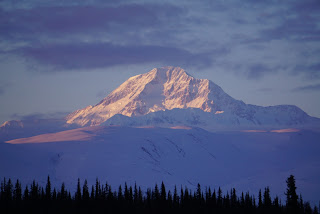One afternoon during my stay at Denali View Lodge (see two previous posts), when people were relaxing in the living room after skiing, Eric, the chalet's owner, held up a book from the side table: "This is the Milepost," he said. "It shows mile by mile what there is to do and see on the Alcan Highway."
I was just walking into the room. I stopped in my tracks.
"I know the Milepost!" I cried, beside myself with excitement. "I was on the Alcan in 1959." People looked at me with dropped jaws. Most of them weren't even born in 1959.
I was in a frenzy of memories. "The whole family—five children and two parents—in a station wagon, from Atlanta, Georgia, to Fairbanks, Alaska, camping out all the way. It was the summer I turned fifteen, the year Alaska became a state."
The stories poured out faster than my tongue could tell them—how primitive the Alcan was in 1959, the Milepost such a small book compared to the volume Eric had. A flat tire on the way back to Whitehorse, then another within an hour, my father hitchhiking with the flat tire on a road where a car might come by once an hour. Being in the Fourth-of July parade in Anchorage in what the Chamber of Commerce had hoped to be a 49-car procession (we were the 46th and last state to show up). My mother collecting wildflowers everywhere we went and painting them at a picnic table at each campsite. Swimming in Muncho Lake, which stayed in memory for a long time as the coldest lake I had ever swum in. (I've been in colder since.) On and on.
I was only telling bits and pieces of stories, everything tumbling out too fast. But one story, the time my sister was bitten by a wolf, could not be truncated, so I told it in its entirety. My audience was enthralled. (I told this story on my blog on May 17, 2018.)
The next night Phil, the cook, matched the wolf story with his grizzly bear story, about being attacked in his tent by a curious young grizzly, who, Phil said, turned aggressive once he got in the tent. The bear had Phil's thigh in his jaws before a friend in a nearby tent heard his cries and came to the rescue with bear spray, which, on the third application in the bear's eyes, drove him off.
 |
| Phil (right) telling his bear story |
Another evening I read my essay about cross-country skiing at Crater Lake from my book Living with All My Senses. I gave the book to Eric and Frédérique when I left, thinking that stories about living in a cabin without electricity would be a fitting addition to the books on the side table—bear stories, with Phil's story in it; a book about treehouses, with a chapter on the treehouse Eric built when he first came to Alaska; and the Milepost, among others.
I'm not sure exactly how it came up, but on another night, after dinner, we discovered that both Phil and I knew, by memory, Robert Service's poem "The Cremation of Sam McGee," so he and I did a double recitation, each of us taking a verse in turn. It's an engrossing story about mushing with a corpse on the cold, inhospitable Dawson Trail. The rhymes and rhythms are spellbinding, and the end, with Sam McGee, revived at his cremation, happy to be warm again at last, is a sudden turn to humor. Reciting it there with a man who had been bitten by a grizzly bear, with the snow piled up beyond the window sills and my muscles still sore from the day's ski—it was a perfect blend of poetry, landscape, and circumstance.
Come to think of it, all the story-telling was a perfect blend of poetry, landscape, and circumstance.
(I tell other Alaska stories in blog posts on June 30, 2016 [Fourth-of-July parade]; February 4, 2016 [wildflowers my mother painted]; and February 16, 2017 [stories about my two-year-old brother with us in Alaska.])
Next week: Cross-country Skiing in Alaska, Part 4: The Extras—Talkeetna, the Iditarod, and others






e.JPG)
.JPG)
.jpg)



















